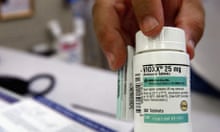The proportion of scientific research that is retracted due to fraud has increased tenfold since 1975, according to the most comprehensive analysis yet of how research papers go wrong.
The study, published on Monday in the Proceedings of the National Academy of Sciences (PNAS), found that more than two-thirds of the biomedical and life sciences papers that have been retracted from the scientific record are due to misconduct by researchers, rather than error.
The results add weight to recent concerns that scientific misconduct is on the rise and that fraud increasingly affects fields that underpin many areas of public concern, such as medicine and healthcare.
The authors said their findings could only be a conservative estimate of the true scale of scientific misconduct.
"The better the counterfeit, the less likely you are to find it – whatever we show, it is an underestimate," said Arturo Casadevall, professor of microbiology, immunology and medicine at the Albert Einstein College of Medicine in New York and an author on the study.
Casadevall and his colleagues examined 2,047 papers on the PubMed database that had been retracted from the biomedical literature through to May 2012.
The authors consulted secondary sources such as the US Office of Research Integrity and Retraction Watch blog, which highlights cases of scientific misconduct, to work out the reasons for each of the retractions.
Their results found that 67.4% of retractions were attributable to scientific misconduct and only 21.3% were down to error. The misconduct percentage was composed of fraud or suspected fraud (43.3%), duplicated publications (14.2%) and plagiarism (9.8%).
In addition, the long-term trend for misconduct was on the up: in 1976 there were only three retractions for misconduct out of 309,800 papers (0.00097%) whereas there were 83 retractions for misconduct out of 867,700 papers at a recent peak in 2007 (0.0096%).
Among recent and well-publicised cases of scientific fraud is that of the South Korean stem cell scientist Hwang Woo-suk, who was dismissed from his post at Seoul University in 2006 after fabricating research on stem cells.
Ferric Fang, a professor at the University of Washington school of medicine and co-author of the study, said the prevailing assumption that most retractions were down to honest error by researchers had been maintained for years because retraction notices in scientific journals were often opaque or misleading.
"Some give no information and others give the appearance of error but when you look at the more detailed report of what happened, it's clear that it's fraud," he said.
Ivan Oransky, editor of the Retraction Watch blog, praised the analysis carried out by Casadevall, Fang and their colleague Grant Steen. "It's now clear that the reason misconduct seemed to play a smaller role in retractions, according to previous studies, is that so many notices said nothing about why a paper was retracted.
"If scientific journals are as interested in correcting the literature as they'd like us to think they are, and want us to believe they're transparent, the ones that fail to include that information need to take a lesson from those that do."
The authors of the study said this could be due to the increased scrutiny placed on the research in these journals and the greater uncertainty associated with the most cutting-edge research. "Alternatively, the disproportionately high payoffs to scientists for publication in prestigious venues can be an incentive to perform work with excessive haste or to engage in unethical practices," they wrote in PNAS.
James Parry, director of the UK Research Integrity Office said that the principles of good research practice, such as being honest and objective, are often thought to be obvious. "Studies like this show that good research practice should be self-evident but often isn't."
Chris Chambers, a psychologist at the University of Cardiff said he found the results disturbing but not surprising. "They confirm that misconduct is increasing and is the most common reason for retraction, particularly in high impact journals. Above all this shows us how broken the incentive structure of science has become."
Casadevall said the pressures to commit fraud came from many sources - not least the competition for scarce funding for research. In addition, the disproportionate rewards given to scientists who publish in high-impact journals mean that some may succumb to the temptation of making their results seem more impressive than they actually are.
A first step to working out the true scale of the wider problem, though, would be to make journal retraction notices more transparent. "We're hoping the scientific publishing business sits down and tries to identify some standards," said Casadevall. "Right now the retraction notices are written by the authors and that probably makes sense because they know what the problem was. But we are learning that, in cases of fraud, there's a desire to make the issue confusing, that is not to admit it."
Fang said that, despite highlighting problems, it would be wrong to take the message away from the study that science is somehow untrustworthy as a whole. "People who are opposed to science for their own reasons cannot take any solace in our findings as supporting them. You could look at this the opposite way and say that we find that a very few papers end up retracted. This is a very strong endorsement of the overall quality of science. That said, we would like the fraction to be even smaller."
Chambers said that the studies such as this would be vital in making science more robust. "They turn scientific methods to back on science itself. Self-scrutiny stops us from fooling ourselves and shows where we need to improve our culture and practices. I'd even go so far as to say that studies like this are more important than much of the science that gets reported."






Comments (…)
Sign in or create your Guardian account to join the discussion